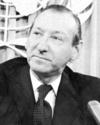- Waldheim, Kurt
-
born Dec. 21, 1918, Sankt Andrä-Wördern, AustriaAfter military service in the German army before and during World War II, he entered the Austrian foreign service and served successively as ambassador to Canada (1958–60) and the UN (1964–68, 1970–71) and as foreign minister (1968–70). Elected to succeed U Thant as UN secretary-general, he served two terms, during which he oversaw disaster relief in Bangladesh, Nicaragua, and Guatemala and peacekeeping missions in Cyprus, the Middle East, Angola, and Guinea. Denied a third term, he returned to Austria and ran for president in 1986. His candidacy became controversial when it was learned that he had been a member of the Nazi Party and had served in a German army unit that had deported most of the Jewish population of the Greek town of Salonika to Nazi death camps in 1943. Elected nonetheless, he was diplomatically isolated throughout his term (1986–92).
 Waldheim, 1971UPI
Waldheim, 1971UPI* * *
▪ president of Austriaborn Dec. 21, 1918, Sankt Andrä-Wördern, Austriadied June 14, 2007, ViennaAustrian diplomat and statesman who served two terms as the fourth secretary-general of the United Nations (UN), from 1972 to 1981. He was the elected president of Austria from 1986 to 1992.Waldheim's father, a Czech by ethnic origin, changed his name from Waclawik to Waldheim. Kurt Waldheim served in the Austrian army as a volunteer (1936–37) before he began to study for a diplomatic career. He was soon conscripted into the German army, however, and served on the Russian front until 1941, when he was wounded. Waldheim's later claims that he spent the rest of World War II studying law at the University of Vienna were contradicted by the rediscovery in 1986 of documents suggesting that he had been a German army staff officer stationed in the Balkans from 1942 to 1945.Waldheim entered the diplomatic service in 1945. He served in Paris (1948–51) and was head of the personnel department of the Ministry of Foreign Affairs in Vienna from 1951 to 1955. He led Austria's first delegation to the UN (1955) and subsequently represented the country in Canada (1956–60), first as minister plenipotentiary and then as ambassador. After a period as director general for political affairs in the Austrian Foreign Ministry, he became his country's ambassador to the UN (1964–68, 1970–71). During 1968–70 he served as Austrian foreign minister. After the electoral defeat of the Austrian People's Party, Waldheim was elected chairman of the Safeguards Committee of the International Atomic Energy Agency. In 1971 he ran for president on the People's Party ticket but lost.Waldheim's UN secretaryship beginning in 1972 was characterized as efficient and ministerial. He oversaw effective and sometimes massive relief efforts in Bangladesh, Nicaragua, the Sudan-Sahel area of Africa, and Guatemala, as well as peacekeeping operations in Cyprus, the two Yemens, Angola, Guinea, and, especially, the Middle East. Waldheim also took a special interest in the future of Namibia and South Africa. He was reelected in 1976 despite some opposition from less-developed countries, but a third term was vetoed by the Chinese government in 1981.In 1986 Waldheim ran once again as the People's Party candidate for president of Austria. His candidacy became controversial, however, with the dissemination of wartime and postwar documents that pointed to his having been an interpreter and intelligence officer for a German army unit that engaged in brutal reprisals against Yugoslav Partisans and civilians and deported most of the Jewish population of Salonika (Thessaloníki), Greece, to Nazi death camps in 1943. Waldheim admitted that he had not been candid about his past but disclaimed all knowledge of or participation in wartime atrocities. He won election to the Austrian presidency in June 1986 for a six-year term. An international investigation by a committee of historians cleared Waldheim of complicity in war crimes, but as president he was a rather isolated figure on the international scene. Consequently, he chose not to run for a second term in 1992. The “Waldheim affair” triggered a fundamental debate in Austria about the country's past during World War II.Additional ReadingKurt Waldheim, In the Eye of the Storm: A Memoir (1985); International Commission of Historians Designated to Establish the Military Service of Lt. Kurt Waldheim, The Waldheim Report: Submitted February 8, 1988, to Federal Chancellor Dr. Franz Vranitzky (1993); Robert Edwin Herzstein, Waldheim: The Missing Years (1988); David F. Good and Ruth Wodak (eds.), From World War to Waldheim: Culture and Politics in Austria and the United States (1999).* * *
Universalium. 2010.
